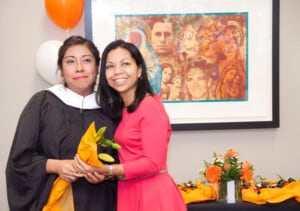When choosing graduate programs in social work, Alejandra Spector selected The University of Texas at Austin because of the possibility of a dual degree with Latin American studies. An activist of mixed Chicano, Jewish, and Mexican background, Spector wanted to complement her social work education with a thorough understanding of Latin American history and politics.

Little did she know that another Chicana activist, Cintia Huitzil, had paved the way for her at UT Austin. Huitzil, who graduated with a master’s in Latin American studies in spring 2014, was instrumental in making the dual degree with social work a reality at the university. The dual degree, to begin in fall 2015, is the first of its kind in the country (Find more information about the degree here).
A native of Los Angeles, Huitzil came to the Forty Acres with experience working with Latino immigrant populations and a deep interest in how immigrant communities are served, and perceived, in the United States.
“I wanted to take advantage of my educational opportunities to bring to light what seems to be an elephant in the room in my immediate community. As a student, service provider, indigenous woman, and second-generation Chicana, I came to see public social services and service provider practices through different lenses,” Huitzil said.
Looking for courses that addressed both her interests in service provision and Latino populations, Huitzil found one at the School of Social Work. The course was not cross-listed with Latin American studies, however, which felt like a disconnect for Huitzil and made the need for a dual degree in the two disciplines all the more apparent to her. She shared these thoughts with faculty and fellow students, and discovered that she was not alone. With the encouragement of faculty and in collaboration with other students, she presented a written proposal for a dual degree that had the support of Luis H. Zayas, dean of the School of Social Work, and Charles Hale, director of LLILAS Benson Latin American Studies and Collections.
“Combining both disciplines helps us to better understand the complicated love-hate relationship between what has traditionally been defined as the north and south, as well as the people challenging such traditional conceptualizations through their mere daily interactions and overall presence and influence in our lives in the United States,” Huitzil explained.

Such challenges to traditional conceptualizations were at the core of Alejandra Spector’s activist experiences in El Paso, particularly after Mexican president Felipe Calderón declared the war on drugs in 1996.
“El Paso, or rather Ciudad Juárez and the surrounding areas, turned into a war zone,” Spector recalled. “Mexicans fleeing from the violence came to El Paso in droves, and nobody knew what to do. There was also much denial on both sides of the border, pretending that the situation had to do only with crime and not with corruption and politics. But deep down we all knew better.”
Spector joined Mexicanos en Exilio, a collective that supports Mexicans who are fleeing state violence and seeking political asylum in the United States. The group currently represents more than two hundred families, most of whom come from the town where Spector’s paternal grandmother was born.
“This little town became one of the most violent places in Mexico. Residents would go to Ciudad Juárez for protection, which shows how bad it was,” Spector explained. “Mexicanos en Exilio became this very personal project, because this was the town where my grandparents had met and fell in love, and where my family and I knew so many people and had so many relatives.”
Spector quickly realized that Mexican exiles in El Paso had suffered a tremendous amount of trauma, and needed support to address it. Eventually, she was able to set up a program whereby therapists in Mexico provided weekly counseling to their countrymen in El Paso at no cost via Skype.
“It was amazing, but it was exhausting too. We were outside of town, where Internet connection was not reliable, I had to ease people’s resistance to working with a computer, I had to coordinate and troubleshoot weekly sessions for fifteen people … I could really not do anything else, I was on call all the time. But we did it, for a full year. It was probably the most important thing I have ever done in my life.”
This experience led Spector to apply to the master’s in social work at The University of Texas at Austin. But she also wanted an interdisciplinary component that would allow her to combine her recently found interest in counseling with her life-long interest in Latin America.
“I have gotten educated about Latin America through my activism but I lack formal education and I feel there are still many gaps in my knowledge. I also want to see what other people across Latin America are doing about state violence and the ensuing trauma, and be able to draw parallels with the situation in Mexico.”
Huitzil had promoted the dual degree precisely with these kinds of gaps in mind during her time on the Forty Acres. She is now back in Los Angeles, where she supervises Dignity Law Collective, a nonprofit that provides legal assistance to immigrant women and families who have been victims of domestic violence. She plans to start a doctoral program in social work next fall.
“I am pleased that those of us whose efforts went into supporting the dual degree initiative have left something behind, especially something that we feel will benefit future generations of students to come,” Huitzil said. “I wish the very best to the students, faculty, and staff who will be a part of this new social work and Latin American studies master’s program.”
Posted November 24, 2014. By M. Andrea Campetella and Susanna Sharpe. Photos by Miguel Gutierrez Jr. and Mari Correa


